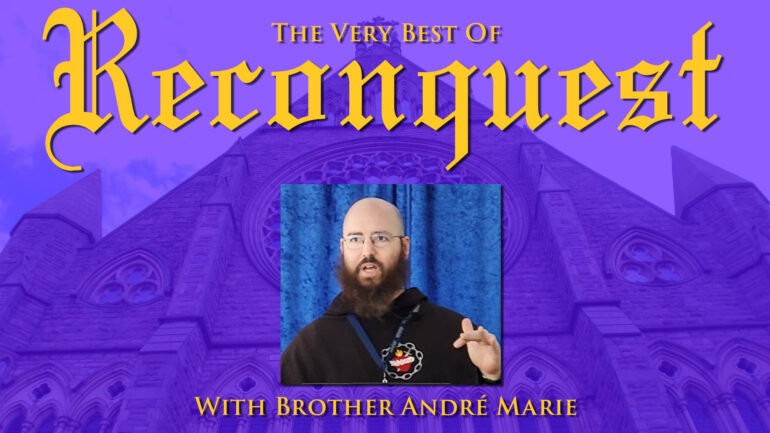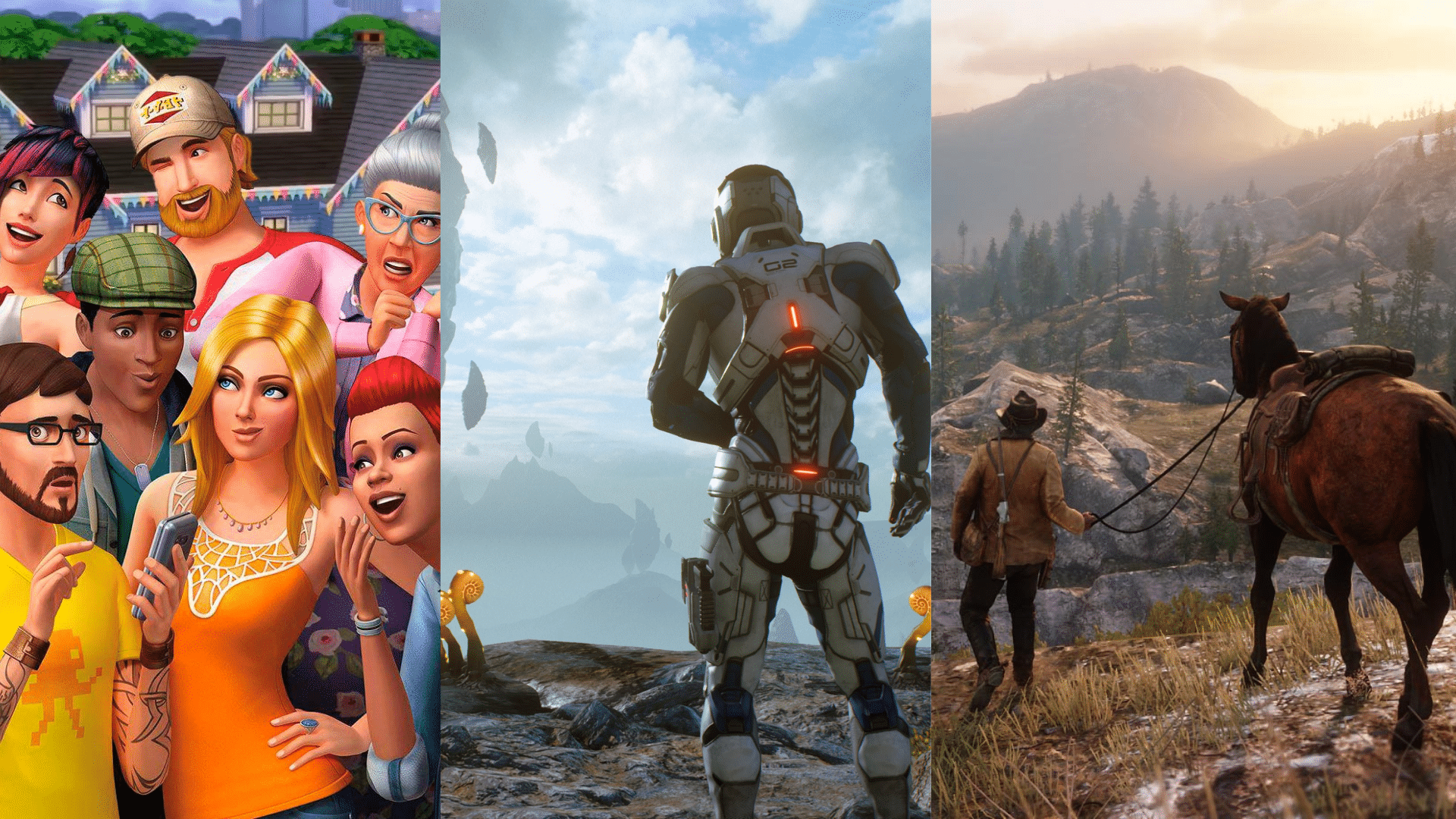-
play_arrow
CRUSADE Channel Previews CRUSADE Preview-Call 844-527-8723 To Subscribe
Christopher Laurence Examines: Morality & Gaming, Part 2: A Dialogue
Part 2 of our series on Morality & Gaming is a conversation with CJ Alley. Mr. Alley is a designer, long-time gamer and Traditional Catholic. In this, part one of a two-part interview, Christopher Laurence engages Mr. Alley in a discussion on morality in video games in general, and if and how design decisions within gaming mechanics can incline players to one moral pathway or another.
Christopher Laurence: Ok, so to start, if you don’t mind, I’d like to know a little bit about your gaming history. About what age did you start playing games? And do you remember what some of the first games you played were?
CJ Alley: At six or seven I got started on the NES [Nintendo Entertainment System] and then I saved up and a couple of years later, my parents let me buy a Super Nintendo from my uncles in college. And my mom told me, “don’t tell them how much money you have, because they’ll ask for that.” And I told them I had the full sixty dollars, and they wanted sixty dollars. But I got that and got Super Mario World. I think I got a Gameboy for Christmas one year. I got Tetris and Super Mario and Donkey Kong.
Christopher Laurence: That’s almost exactly the kind of gaming path that I took. I started with — it must have been Super Mario Three. That’s the one that I have the most vivid memories of, anyway. Although before that, when I was really young, we had a Radio Shack computer that had a thing that looked like a cassette tape deck, and that was the disk drive, believe it or not. And there was this game, I don’t remember the name of it, but this is the first game I have an actual memory of playing. It was some game where you were playing as like, two little fuzzy alien things that were jumping on some kind of trampolines. For some reason, the higher you got them to jump, they got more peanut butter sandwiches. Don’t ask me what the name of it was, what the actual goal was, if it made any sense at all. But that’s the first game I have a formal memory of actually playing. And then after that, the one that really stuck out in my head is Super Mario Three, because I remember thinking — I think Nintendo Power still existed as a magazine at that time…
CJ Alley: That was good stuff.
Christopher Laurence: And I remember seeing a screenshot of Mario Three and my very young mind said, “No. This is impossible. A game can’t look this good.” Which now is hilarious, right? I mean, that’s so funny. But at the time I was like, “This.. this is trickery. There’s no way this is going to look like this when it comes out.” And, you know, it did. I remember being blown away by.. I think that was the first game (and maybe if I’m wrong and you know, you can correct me) but that’s the first game I think that had the Giant World as one of the stages, right? Where everything was really big, all the enemies were giant. And that just blew my mind at the time. Like, how do they make it so big?
CJ Alley: It’s amazing. You know, you need art direction a little, just some guidance behind the pixels, because you look at the same hardware (The NES) and you look at some of these other games, and they have a black background and one screen and stuff.
Christopher Laurence: I have a lot of respect for Nintendo for the consistency, generally speaking, of the quality of their games. And also — and I was talking about this with Rick Barrett just yesterday — I love Nintendo for not really letting SJW nonsense pollute their games, as of yet. So, we haven’t seen transgender Princess Peach, or Toad in a dress, right? So, let me jump ahead and ask what you play now. What are your go-to games these days? What are some pieces of gaming that come to your mind, that you’ve played maybe the last five or ten years, that stand out as being particularly enjoyable?
CJ Alley: Little Big Planet (2008). Red Dead Redemption (Western-themed, open-world game, 2010).
Christopher Laurence: The first one or the second one?
CJ Alley: I got the second one, but I only play online, because I just really like having a.. you can just go ride your horse and see all this nature, virtual nature stuff. I kind of saw the highlights of the story campaign. I still want to play it. Just something about it seems like kind of a ringer to go through.
Christopher Laurence: It is.
CJ Alley: I never finished the first one. I got his ranch back, John Marsden’s [the protagonist of Red Dead Redemption] and I thought the game was kind of just over, because it just seemed like post-game content; doing the ranching stuff with your son. So, I did a couple of those missions and I was kind of wandering around and then I left the console at home with my family while I was at college. And they apparently left it on all the time just for Netflix or something, you know? And it overheated. So I lost that file. And then I found out what happens after that [the game’s concluding mission]. And I never wanted to do that. So I played it a couple of times, but I always stopped once I got to the ranch.
Christopher Laurence: Yeah, it’s a real gut-punch ending, that one.
CJ Alley: I think artistically that’s a very good game.
Christopher Laurence: I agree. And that’s an important distinction to make. There are these kind of — they’re almost like digital iconoclasts, right? These people that are just uniformly against video games. But it is possible, especially in the last twenty years, for games to reach the level of art. And again, I don’t see how you make a clear distinction between something like a masterful film, like a Kurosawa epic — Seven Samurai — and something like Red Dead Redemption. Now, people who are unfamiliar with gaming are going to laugh that off. But from a narrative perspective, from a visual perspective, pacing, dialogue; the only thing that separates the two is interactivity. And I don’t see why that should be considered as a negative. It’s one thing if you’re able to ruin the narrative of the game. And I imagine, not being a designer myself, and maybe you’ll have some insight into this; I imagine that it’s a tough tightrope to walk. Being a game designer, wanting to parse out your narrative over the course of the hours that your audience spends playing the game, but also giving them enough freedom within the game. So you don’t want to have an on-rails experience, but you don’t want the narrative to be disrupted in a catastrophic manner by choices the player makes. And I’m assuming that that’s a difficult balance to achieve. Do you have any thoughts on that?
CJ Alley: Yeah, I’ve reflected on that a great deal, especially with Red Dead Redemption and some other, mostly open-world games, especially because you can go anywhere, and some of these little side quests that either just give a flavor to the world or an addition to the game which kind of ties back into the main story, they could pop up for you in a non-ideal place in the story and I think — Usually it seems like they do a good job of it. They put it off in these places you haven’t explored yet. A place where you get a view of the land, and they kind of understand where you want to go, where the player is kind of curious, and they put the stuff over there. But even so, all of the possibilities are kind of mind-boggling; that they pull it off and that you can make a couple of different choices out of order. And it still works for the most part.
Christopher Laurence: The open-world gaming trope is something that becomes, I think, very problematic, because as far as immersion goes, you would think that it would lend itself more to an immersive experience. But I personally find myself in the situation quite often in these games where the main quest presents you with, or attempts to present you with, a sense of urgency; hurry up and go and do this or, you know, the king will die. Or race to the castle before the dragon attacks. But if you don’t, if you go wander and level up doing side quest for four days, the king is still sitting there when you get there, the dragon hasn’t burned the castle down. So it’s another one of those things which are tough to balance if you’re going for any kind of immersion, and it’s particularly distracting to the story. In an RPG [role-playing game] the whole essence of the thing is role-playing. So if you’re attempting to immerse yourself in the game as your character, in a world that’s attempting to be as real as possible to you, yet time doesn’t seem to exist, there’s a fourth-wall type of break there that I don’t know how a designer would overcome.
CJ Alley: Yeah, and I don’t think a lot of them do. I know there are some games, maybe Skyrim, or the second Red Dead [Redemption] where there are things that are timed, such that if you don’t take care of them or attend to them, you’ll come back and see that event has passed. But as far as a main narrative, they don’t usually do it, and I think part of it is just because it’s hard to keep — there could be a big gap of time where you get a lot invested in something, and if you’re having an active time condition in regards to what happens in the main narrative, and you fail, making that part of the game is either too much for the programmers to have to branch out from, like they tried to do with Mass Effect [Sci-Fi RPG, 2007], or it’s like, well, do you want to go back to a point where you still have some input in what happens next, but lose a lot of progress?
Christopher Laurence: It’s another one of those difficult balancing acts. So let me ask you this; as the realism of these games increases, the notion of the uncanny valley aside, graphics and immersion are becoming more detailed, more realistic, more enrapturing. How much immersion is too much, and is there such a thing? In other words, I worry a bit about the advent of VR [Virtual Reality]. Now, so far, to my mind, they haven’t gotten it right. I don’t find virtual reality compelling whatsoever. I find it annoying. I think a lot of the games are hokey. They operate on the same basic framework, like, OK, I can pick up a thing now, with my actual hand, or swat the mosquito type of stuff, those kind of swat the mosquito games. But inevitably something’s going to click somewhere for some developer and they’re going to get it right. And now you have near complete immersion, and in fantasy worlds. Is this dangerous?
CJ Alley: I think from a mental health perspective and living a virtuous life, it can be, because there are already people that struggle with being able to find their sense of accomplishment outside of a game. You know what I mean? You can make progress in this game or that game, and that overshadows any kind of accomplishments or goals you have in real life. So if you can get it in VR, where it — I don’t know if it can up the kind of dopamine or immersion levels that much more significantly — but if it did, it could definitely be dangerous in that regard. I’m not sure about the morality aspect because all the morality decisions, problems that we’ll hopefully get into it at some point, are already there, because you’ve got a big screen TV, if you’ve got a good comptroller scheme, you kind of dial in to what you’re doing, whether it’s in third person or first person perspective. You’re immersed in the game.
Christopher Laurence: Right. So, I do want to talk about the morality issue. It’s the main focus of what I’m setting out to do. And as you know, what I’m interested in are real world implications for moral choices made in video games. And there’s a lot of distinction and nuance underneath that heading. That’s kind of a broad idea. So just to start, I’m very curious about, and I don’t hear anyone talking about, is there a psychological effect? Is it a chicken and egg thing? In other words, if I play a game where I have the option to play the role of a thief, and I go about just indiscriminately stealing from everybody, back-stabbing innocent characters, is the option being there making it so enticing that it leads me to do it, and therefore I may be suffering psychologically or spiritually detrimental effects as a result? Or, option two, are there no effects as a result (I’m going to give you a bunch of options) and people are uniformly able to separate reality from gaming? Or are there those who are unable to separate reality from gaming, and only in those extreme cases may there be an after-effect? Or, finally, does that predilection have to exist before engaging in the game, and it’s something in my psyche that exists already which is causing me to make those choices, when I could have chosen the virtuous path?
CJ Alley: Well, there are a lot of board games and card games where the structure of the game involves you bluffing or lying or maybe you get to take somebody elses things, but it’s usually within the rules of the game, versus a simulation where you’re sort of in a world where there is virtue, and ethical choices. I guess for me, on the violent scale, I’ve never felt compelled (maybe it’s because the consequences are more imminent versus, you know, if you get caught stealing) I never felt compelled to or had any increase in desire to attack someone or shoot someone or do anything like that.
With stealing, I’m glad you used that analogy, because there’s something about being sneaky, as kids you like playing hide and seek and stuff. And it’s kind of fun, the essence of being sneaky and hiding and getting away with things. I’m not so sure just within the game framework. As part of the game, even if your character is an immoral person, I don’t know how to deal with that, because I do definitely see problems (and maybe we could come back to that if you have more thoughts) but quickly, I see more problems when you’re interacting with other real players in a multiplayer setting. Even if it’s not hurting them, even if it’s within the rules, I definitely see — you come across other players where there’s something pathological; they want to grief you and they want to bother you and make this thing un-fun. So, I think that has implications for their soul. It does seem you can come across some pretty messed up people, right?
Christopher Laurence: Ok, let me present a different aspect of this. In regards to stealing in games, (I admit, I personally experienced this myself) it triggers that same kind of instant gratification in the pleasure receptors. Because you’re short-cutting something, or it seems that way, anyway. So, if I’m playing Skyrim [first-person fantasy RPG, 2011]; and I’m not a big fan of Skyrim, but I’ve put a significant amount of hours into it, regardless. So let’s say you’re playing Skyrim; you need money; you want to buy the glass long-sword, or whatever it is. So you can either go around accepting heroic quests from people, and getting their pittance of a reward, and keep doing that over time so you have enough money to get the item. Or, you go into the shop, you put a bucket over the shopkeeper’s head, right? That glitch in the game [there was a well-known glitch in the A.I. programming for the game, where if you placed an item, such as a bucket, over the head of a character, he would not be able to see, and would also be unable to remove it]. He can’t see anything, and you just rob him blind. So you’re short-cutting it, and you get that little peak of pleasure response because, one, as you say, you’re getting away with something. So there’s that. There’s that adolescent notion of, “oh, what can I get away with? I just got away with this,” but you’re also getting that pleasure because it’s not simply short-cutting something, but it’s committing an immoral act.
Now, this is where it becomes a little bit foggy, because it is in a virtual reality and a game. But is there a problem there, do you think? Because we are triggering those pleasure receptors, that instant gratification, that ease of attainment. Do you think that there’s a chance that we carry that out into the real world? So, in other words, one hundred hours in Skyrim robbing everyone blind, is there a chance that next time I’m in the grocery store, that pack of gum is sitting there, and I might get that tingle in the back of my neck that says, “I’m going to get that exhilarating feeling if I just slip this into my pocket,” or is it a case by case basis? Is it solely based on each individual?
CJ Alley: I think that might be more prevalent than somebody adopting a violent persona or something. Ok, I get your distinction. Is it doing something derogatory to our souls, our mental makeup, because in a virtual game with no other real players, there’s nothing actually wrong happening, except narratively, in this little video game story. But is it doing something to us because we’re getting this mental responsive reward for it in our heads? I think it would be case by case, because sometimes you just adopt a certain persona for a video game. When I got into basketball simulation games, I noticed this pattern; when I was in high school I’d play a certain way during the season, in real life, and I would notice if that season I was really good at finishing at the rim, but I was a poor perimeter shooter, I’d make a character for the season in-game, and that character would become a good three-point shooter. And I didn’t put this together for a couple years later. And I know now I’m a good three point shooter, but I’m not going to the rim as much. And I noticed my character in the video game, I purposefully tried to make go to the rim, do layups and dunks or whatever. And so I think if there’s a certain game mechanic hook that you’re interested in you kind of adopt your persona [in-game] to something where you can rationalize it in your head; like this would be cool or this is acceptable, just in this scenario.
Christopher Laurence: Ok, so that’s very interesting what you say. So your example is completely innocuous; making a player with different athletic traits. But I have to imagine that — now, I don’t buy into the idea that video games make kids violent. I think this has to be something that they’re predisposed to in the first place. Is it possible that hours of violent gaming, especially with the levels of realism that we’re operating at now, exacerbate that problem? Absolutely, I will grant that. But I don’t think it creates it. But at the same time, is there a problem on the other side of what you say, especially for young people, that they’re engaging in acts in games that they wouldn’t normally engage in in real life, because society keeps them in check, but not because they feel morally bound not to? In other words, fear of jail keeps little Bobby from robbing the Game Stop, but it doesn’t stop him from running over everyone on the side of the road in Grand Theft Auto [infamously morally-problematic game series, first installment released 1997] because there are no real consequences. But he still gets that kick from it. I guess running everyone over is not a great example because that’s a little over the top.
CJ Alley: Well, not if it’s a… no, no.
Christopher Laurence: But if we stick with the thievery, if little Bobby has the impulse to be a kleptomaniac, but he doesn’t feel morally reigned in, he feels reigned in because he’s afraid of prison, or daddy spanking him or whatever it is, but he doesn’t have those consequences in-game. So, the moral impulse is the same there, or rather the lack of it. Is that something that gaming is then — it’s not making it cathartic, because he’s not saying, “well, I did this in the game, and now I don’t feel like I need to anymore,”. But he’s doing it in the game and saying, “this feels good, and I wish I could do this in real life.”
CJ Alley: That’s why I think it’s really important for parents to parse out what they let their kids do, because especially with games like Saint’s Row or a Grand Theft Auto or anything with a stealing mechanic or where you can assault other characters that are N.P.C.’s [Non-Player Characters] that aren’t bad guys. Even playing just shooter games, they’ll say, “I understand what happens with the gun in real life, but this is a game where these are all bad guys.” But little Bobby, his parents let him play and he does get that feeling from stealing, or maybe has anger issues and he just curb stomps a pedestrian, and it’s not so much the act, but if he ties into that emotion he gets from that — I think stuff like that, or these very graphic shooting games or fighting games, something like that can be negative to the soul, like akin to a pornography.
Christopher Laurence: Yeah, I would agree with that. So, of course, ultimately, the lack of parenting is a major problem when it comes to gaming these days, because the oversight the parents should have over what their children play has largely disappeared. And I think one of the things that’s become even more detrimental — now, obviously, gung-ho First Amendment types and people who are patriotic to the extreme are going to say, “that’s not right!”, but I I hate that the unwillingness on the part of game stores to sell games to underage kids if the rating for that game was such that they weren’t supposed to buy it, has kind of gone by the wayside. I think that was a perfect way to keep these things in check. But, of course, profit is king. And if they can find a legal way to get around it, which they did, they do so. And parents have largely abdicated their responsibility for knowing what their children are getting involved in and participating in recreationally. That was kind of the last safeguard in place. I mean, do you think that was a good idea to have those restrictions there, or is that some kind of an infringement on both a truly capitalistic society, which has its own problems, and the rights of individuals and parents? Was it an overreach?
CJ Alley: I think we probably think the same. If we go within the framework of just the Constitution, I guess maybe not. Right? But if we want the framework of Natural Law and Catholicism, yeah, that’s right. We want certain things to not be available to people, for their own good.
Christopher Laurence: And that’s become a devastatingly difficult idea to impart to people. Because if you even mentioned something like censorship in the modern world, people that consider themselves conservatives and serious Christians will go into an uproar. But censorship is not an intrinsic evil. I hate to tell people this, but it can be a very useful tool for keeping one’s soul out of harm’s way. I mean, not everyone is possessed of a perfect level of temperance at all times. I know I certainly don’t possess that. Sometimes I need something from the outside to give me that little push to reconsider what I’m about to undertake. But that’s very unpopular. It’s very unpopular in Western society, especially in Capitalistic societies and our so-called Constitutional Republic. Ultimately, just as in the Church, salvation of souls is the highest law, and that should be extended everywhere.
So, let me let me ask you this, then: is it more probable that the problems exist not in the games offering these choices, but in the moral breakdown of the people engaging in them? So, in a game like we spoke about, Skyrim, I could see someone making the argument that the thief is a class in RPGs, therefore that choice is out there in the open. If a kid chooses it, it’s more the fault of the game designer for having that option in there. But at the same time, The Sims [family simulation game series, first installment released 2000] is, on the surface, a completely innocuous, family simulation game. But it doesn’t stop certain people, and certain kids, from putting their character in a room with no door and then setting the house on fire, right? So, this is kind of the idea of the four-year-old with the magnifying glass…
CJ Alley: It’s the digital anthill.
Christopher Laurence: Right, exactly. So is the problem not in the game, but in what the person engaging in the game is bringing to it? Do you think the scale is weighted more on one side than the other, or is it equal? In other words, is the game giving you those choices as much of a problem as people choosing to engage in those choices within game?
CJ Alley: There’s ways to balance the way the game rewards such things and punishes some things or [the way it] portrays it. But, it’s usually on the person. And going back to if we put a little kid in this position where they can steal or curb stomp an N.P.C. and beat them up, versus if it’s an adult, who can recognize [their] own emotions and what that means. So if I do something in the game, and I get this sensation, or realize I’m not in a good place because I’m enjoying this inordinately, or in a weird way, I’m going to shut this down and go do something else and think about that. Whereas a kid doesn’t have that self self-awareness.
Christopher Laurence: No, almost certainly not. Which again, ties back into the idea of parents being parents, which you don’t see very much of. So I want to take a big leap to a different subject which I’m curious about, and see if you have any thoughts on this. So, there are games, and I think a lot of the old-school kind of isometric RPGs, and actually, even some of the newer ones are where I mostly remember seeing this. It’s the idea of these false deities in games. So, I remember in Baldur’s Gate [third-person, isometric RPG, 1998], and games like that, you could choose a deity when creating a character, and based on the deity you chose to worship in-game, you get certain bonuses to your stats. For example, if you choose — and some are really evil, they would tell you, this is the deity of murder or whatever — you would get a bonus to your back-stabbing skill, or whatever it is. Is there some way to make an argument that this is actual idolatry, or actual worship of false gods? Or is it simply another aspect of the fantastical that has no implications for our actual, real-world morality whatsoever?
CJ Alley: I do not think, per say, and just using the mechanism that you’d see in a Baldur’s Gate, or a Dark Souls [third-person, action RPG, first installment released 2011], where they have the different covenants or something, I don’t think just in the mechanism itself — this is like when I read my girls The Lord of the Rings, ok? I say, “Tolkien was Catholic. You can see if we go into the Silmarillion when you’re older, that there are these deities. But if you look at how they’re made, they’re basically his versions of — (and he didn’t like one-to-one analogies or anything) but, this is fictional, and you can see a lot of corollaries to the Catholic faith and the Trinity, and then angels and then the start of the world.” So we were going through a history book and there was Egypt, and all these little things about different gods. And I said the whole, “the gods of the nations are demons” [1 Corinthians 10:20, Psalm 85:5, Douay-Rheims numbering) or some sort of human fault where they start worshiping something that isn’t God, or it’s a distortion of history where they distort the image of God and they worship that. So, in video games it all conceptualizes — this is a fictional world. Now, there could be really zealous players, I think, where video games themselves could be an idol. So they could definitely get into a role where they are really proud of this certain class or something, where in game they have this data or something they worship. But I think they have to be a really overly zealous player that already has a problem.
— In part two of our conversation, coming soon, CJ Alley and I will discuss the implications of occult elements in games, the presence and use of “magic”, Pokemon, the misuse or abuse of Catholic imagery and ideas by game designers, and more.
Our Readers And Listeners Keep Us In Print & On The Air!
Click here to subscribe to The CRUSADE Channel’s Founders Pass Member Service & Gain 24/7 Access to Our Premium, New Talk Radio Service. www.crusadechannel.com/go
What Is The Crusade Channel?
The CRUSADE Channel, The Last LIVE! Radio Station Standing begins our LIVE programming with our all original CRUSADE Channel News hosted by Ron Staffard. Coupled with Mike “The King Dude” Church entertaining you during your morning drive and Rick Barrett giving you the news of the day and the narrative that will follow during your lunch break!
We’ve interviewed over 300 guests, seen Brother Andre Marie notch his 200th broadcast of Reconquest; The Mike Church Show over 1200 episodes; launched an original LIVE! News Service; written and produced 4 Feature Length original dramas including The Last Confession of Sherlock Holmes and set sail on the coolest radio product ever, the 5 Minute Mysteries series! We were the ONLY RADIO outlet to cover the Impeachment Trials of President Trump from gavel to gavel!
Now that you have discovered The Crusade, get30 days for FREE of our premium News-Talk Radio service just head to:
https://crusadechannel.com OR download our FREE app: https://apps.appmachine.com/theveritasradionetworkappIti-
Did you know about Morality & Gaming? If you are interested in supporting small business, be sure to check out the official store of the Crusade Channel, the Founders Tradin Post! Not to mention our amazing collection of DVD’s, Cigars, T-Shirts, bumper stickers and other unique selection of items selected by Mike Church!
Written by: Christopher L
Similar posts
SEARCH
ON AIR

The Very Best Of ReConquest With Brother André Marie
Militant, engaging, and informative Catholic radio featuring interviews & commentary from Brother André Marie, M.I.C.M.
close-
Recent Posts
RECENT PODCASTS
TRENDING
SEARCH
NOW PLAYING

The Very Best Of ReConquest With Brother André Marie
Militant, engaging, and informative Catholic radio featuring interviews & commentary from Brother André Marie, M.I.C.M.
closeUpcoming shows
SIGNUP FOR DAILY PROGRAMMING UPDATES
Copyright BlackHat Studios 2026 dba The CRUSADE Channel, All Rights Reserved













Post comments (0)